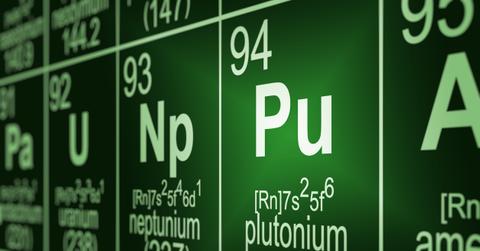While Working on the Atomic Bomb, a Chemist Ingested Plutonium. What Happened Next?
The scientist who ingested plutonium went on to live a full life, making it to age 87 — despite plutonium detected in his urine decades later.
Published March 8 2024, 12:23 p.m. ET

We hold immense concern about heavy metal exposure for ourselves and children, and we take the threat of "forever chemicals" in our food seriously — so the prospect of ingesting plutonium, a chemical element found in the atomic bomb, is understandably concerning and obviously unsafe.
After (most) people survived the trend of Tide Pod consumption and various other ill-advised taste experiments, some social media users wondered aloud what the atomic element plutonium tastes like.
Little did they know, there is a fascinating history involving the accidental ingestion of plutonium decades before X (formerly Twitter) users ever birthed the thought to ask the question. Let's explore the lesser-known tale of the time a scientist tasted plutonium and became radioactive for the remainder of his life — and what he said about how the element tastes.

What does plutonium taste like? One scientist found out by accident.
According to one man who tasted plutonium by accident, plutonium has a metallic taste.
In August 1944 in Los Alamos, N.M., while working on the Manhattan Project, then-23-year-old chemist Donald Mastick broke a vile containing plutonium, whereupon the purplish part-liquid solution (some of it had already converted to gas) then shot into his mouth, leaving behind a metallic taste, according to an excerpt from the book America's Secret Medical Experiments in the Cold War published in The New York Times.
Mastick, who had been approached by Manhattan Project director J. Robert Oppenheimer to work at the site where research and development into the atom bomb occurred, effectively became radioactive.
"Mastick's breath was so hot that he could stand 6 feet away and blow the needles on the radiation monitors off scale. His urine contained detectable plutonium for many years," according to the book excerpt.
After the question of what plutonium tastes like started to go viral on social media, per News 18, some theorized that Mastick couldn't be the only researcher to have ingested plutonium due to its ubiquitous use across university chemistry labs.
A viral tweet posted in December 2023 (seen above) included a screenshot of a Google search result claiming that plutonium has a sweet taste. However, IFLScience clarified that Google likely generated this answer from a similarly-named energy powder review.

What happens if you eat plutonium?
Discovered in 1940 and named after the dwarf planet Pluto, per the Royal Society of Chemistry, plutonium is an element on the periodic table that is still utilized today to make nuclear weapons.
Let's state the obvious: Mastick surviving the ingestion of plutonium is a medical anomaly and should not be attempted by anyone under any circumstances.
Per The New York Times, the minuscule amount of plutonium contained within Mastick's vile was "so small it would have fit on the head of a pin." Perhaps having ingested this extremely small amount, combined with the fact that not all of the plutonium in the vile made it to Mastick's lips, contributed to his survival.
Mastick lived until 2007, when he passed away at the age of 87 — 63 years after he accidentally consumed plutonium.
Ingestion and inhalation of plutonium increases the risk of different types of cancer, including bone and liver, according to Bundesamt für Strahlenschutz, the German body for radiation protection, research, and resources.